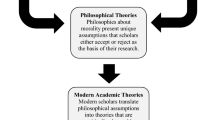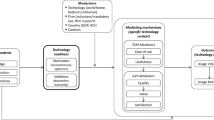Abstract
This study examines the impact of various ethical climate types, dependency factors, and ethical training on ethical optimism of purchasing professionals (n = 151) in India. Instrumental and independence climate types had a significant negative impact on ethical optimism. Other climate types (professional, caring, rules, and efficiency) had no significant impact on ethical optimism. Among the dependency factors, while task uncertainty had a significant positive impact, monitoring had a significant negative impact on ethical optimism. None of the other factors significantly impacted ethical optimism.
Similar content being viewed by others
References
Bartol, K. M., & Martin, D. C. (1988). Influences on managerial pay allocations: A dependency perspective. Personnel Psychology, 41, 361–378.
Bartol, K. M., & Martin, D. C. (1990). When politics pays: Factors influencing managerial compensation decisions. Personnel Psychology, 43, 599–614.
Bolman, L. G., & Deal, T. E. (1991). Leadership and management effectiveness: A multiframe, multi-sector analysis. Human Resource Management, 30, 509–534.
Brown, M. E., & Treviño, L. K. (2006). Ethical leadership: A review and future directions. Leadership Quarterly, 17, 595–616.
Casali G.L. and M. Perano (2020). Forty years of research on factors influencing ethical decision making: establishing a future research agenda. Journal of Business Research. Available at https://www.sciencedirect.com/science/article/pii/S014829632030446X. Accessed on December 17, 2020.
Chan, C. and Ananthram, S. (2018). “A neo-institutional perspective on ethical decision-making”, Asia Pacific Journal of Management, pp. 1–36.
Cullen, J., Victor, B., & Bronson, J. (1993). The ethical climate questionnaire: An assessment of its development and validity. Psychological Reports, 73(2), 667–674.
Cullen, J. B., Parboteeah, K. P., & Victor, B. (2003). The effects of ethical climates on organizational commitment: A two-study analysis. Journal of Business Ethics, 46, 127–141.
Dean, P. J. (1992). Making codes of ethics real. Journal of Business Ethics, 11, 285–290.
Deshpande, S. P. (1996). The impact of ethical climate types on facets of job satisfaction: An empirical investigation. Journal of Business Ethics, 15, 655–660.
Deshpande, S. P., Schoderbek, P. P., & Joseph, J. (1994). Promotion decisions by managers: A dependency perspective. Human Relations., 47, 223–232.
Deshpande, S. P., George, E., & Joseph, J. (2000). Ethical climates and managerial success in Russian Organizations. Journal of Business Ethics, 23, 211–217. https://doi.org/10.1023/A:1005943017693
Deshpande, S. P., Joseph, J., & Prasad, R. (2008). Impact of managerial dependencies on ethical behavior. Journal of Business Ethics, 83, 535–542.
Deshpande, S. P., Joseph, J., & Shu, X. (2011). Ethical climate and managerial success in China. Journal of Business Ethics, 99, 527–534.
Emerson, R. M. (1962). Power-dependence relations. American Sociological Review, 27, 31–40.
Ferris, G. R., & Judge, T. A. (1991). Personnel/human resources management: A political influence perspective. Journal of Management, 17(2), 447–488.
Festinger, L. (1942). A theoretical interpretation of shifts in level of aspiration. Psychological Review, 49(3), 235–250. https://doi.org/10.1037/h0055434
Filabi, A. and Hurley, R. (2019). The paradox of employee surveillance. Available at https://behavioralscientist.org/the-paradox-of-employee-surveillance/. Accessed on September 16, 2021.
Filipova, A. A. (2011). Relationships among ethical climates, perceived organizational support, and intent-to-leave for licensed nurses in skilled nursing facilities. Journal of Applied Gerontology, 30(1), 44–66.
Fort, T. (2016). Adding ethics to the classroom. BizEd, 15(1), 48–55.
Fritzche, D. J., & Becker, H. (1984). Linking management behavior to ethical philosophy. Academy of Management Journal, 27, 166–175.
Gaertner, K. (1991). The effect of ethical climate on managers’ decisions. In R.M.Coughlin (ed.), Morality, rationality and efficiency: new perspectives on socio-economics, 211–223. M.E. Sharpe.
Hauser, C. (2020). From preaching to behavioral change: Fostering ethics and compliance learning in the workplace. Journal of Business Ethics, 162, 835–855. https://doi.org/10.1007/s10551-019-04364-9
Hsieh, S. H., & Lee, C. T. (2021). Hey Alexa: Examining the effect of perceived socialness in usage intentions of AI assistant-enabled smart speaker. Journal of Research in Interactive Marketing, 15(2), 267–294.
Hunt, S. D., Chonko, L. B., & Wilcox, J. B. (1984). Ethical problems of marketing researchers. Journal of Marketing Research, 21, 309–324.
Hofstede, G. (2001). Culture’s consequences: Comparing values, behaviors, institutions, and organizations across nations. Sage.
Hollingworth D., Glieden C. (2017). Is there any virtue in the ISM Purchasing Code of Conduct? In: Sison A. (eds) Handbook of Virtue Ethics in Business and Management. Springer 1, https://doi.org/10.1007/978-94-007-6510-8_127
Ismail, S. (2015). Influence of emotional intelligence, ethical climates, and corporate ethical values on ethical judgment of Malaysian auditors. Asian Journal of Business Ethics, 4(2), 147–162.
Jaffe, E. D., & Tsimerman, A. (2005). Business ethics in a transition economy: Will the next Russian generation be any better? Journal of Business Ethics, 62, 87–97.
Jian, Y., Yu, I. Y., Yang, M. X., & Zeng, K. J. (2020). The impacts of fear and uncertainty of COVID-19 on environmental concerns, brand trust, and behavioral intentions toward green hotels. Sustainability, 12(20), 8688.
Kancharla, R. and Dadhich, A. (2020), “Perceived ethics training and workplace behavior: The mediating role of perceived ethical culture”, European Journal of Training and Development. Accessed from https://www.emerald.com/insight/content/doi/https://doi.org/10.1108/EJTD-03-2020-0045/full/html.
Kelley, J. (2020). Wells Fargo forced to pay $3 billion for the banks fake account scandal. Available at https://www.forbes.com/sites/jackkelly/2020/02/24/wells-fargo-forced-to-pay-3-billion-for-the-banks-fake-account-scandal/?sh=2050d41b42d2. Accessed on December 28, 2020.
Kersley, R, Klerk E., Boussie A., Longworth, B.S., Natzkoff, J.A., and Ramji, D (2019). The CS Gender 3000 in 2019: The Changing Face of Companies (Credit Suisse Research Institute). Available at https://www.credit-suisse.com/about-us-news/en/articles/news-and-expertise/cs-gender-3000-report-2019-201910.html Assessed December 25, 2020.
Koh, H. C., & Boo, E. H. Y. (2001). The link between organizational ethics and job satisfaction: A study of managers in Singapore. Journal of Business Ethics, 29(4), 309–324.
Kohlberg, L. (1984). The philosophy of moral development. Harper & Row.
Kuokkanen, H., & Sun, W. (2020). Companies, meet ethical consumers: Strategic CSR management to impact consumer choice. Journal of Business Ethics, 166, 403–423.
Kreismann, D., & Talaulicar, T. (2021). Business ethics training in human resource development: A literature review. Human Resource Development Review, 20(1), 68–105.
Lazarus, S. (2017). Bad procurement: A roundup of recent procurement scandals. Spend Matters. Available at https://spendmatters.com/2017/04/06/bad-procurement-roundup-recent-procurement-scandals/. Accessed December 16, 2020.
Liu, Y., Chen, S., Bell, C., & Tan, J. (2020). How do power and status differ in predicting unethical decisions? A cross-national comparison of China and Canada. Journal of Business Ethics, 167, 745–760.
Local Circles.com (2019). India Corruption Survey 2019. Available at https://www.localcircles.com/a/press/page/india-corruption-survey-2019#executive-summary. Accessed October 1, 2021.
Martin, K., & Cullen, J. (2006). Continuities and extensions of ethical climate theory: A meta-analytic review. Journal of Business Ethics, 69(2), 175–194.
McCrea, B. (2019). How can you practice more ethical procurement? Source Today. Available at https://www.sourcetoday.com/supply-chain/article/21867499/how-can-you-practice-more-ethical-procurement. Accessed December 16, 2020.
Newman, A., Round, H., Bhattacharya, S., & Roy, A. (2017). Ethical climates in organizations: A review and research agenda. Business Ethics Quarterly, 27(4), 475–512.
Newman, A., Le, H., North-Samardzic, A., & Cohen, M. (2020). Moral disengagement at work: A review and research agenda. Journal of Business Ethics, 167, 535–570. https://doi.org/10.1007/s10551-019-04173-0
O’Fallon, M., & Butterfield, K. (2005). A review of the empirical ethical decision-making literature. Journal of Business Ethics, 59, 375–413.
Palmer, D. E., & Zakhem, A. (2001). Bridging the gap between theory and practice: Using the 1991 federal sentencing guidelines as a paradigm for ethics training. Journal of Business Ethics, 29, 77–84.
Peng, H., & Wei, F. (2020). How and when does leader behavioral integrity influence employee voice? The roles of team independence climate and corporate ethical values. Journal of Business Ethics, 166, 505–521.
Posner, B. Z., & Schmidt, W. H. (1987). Ethics in American companies: A managerial perspective. Journal of Business Ethics, 6, 383–391.
Remišová, A., Lašáková, A., & Kirchmayer, Z. (2019). Influence of formal ethics program components on managerial ethical behavior. Journal of Business Ethics, 160, 151–166.
Rottig, D., Koufteros, X., & Umphress, E. (2011). Formal infrastructure and ethical decision making: An empirical investigation and implications for supply management. Decision Sciences, 42, 163–204.
Reilly, T., Saini, A., & Skiba, J. (2020). Ethical purchasing dissonance: Antecedents and coping behaviors. Journal of Business Ethics, 163, pages 577–597.
Salancik, G. R., & Pfeffer, J. (1978). A social information processing approach to job attitudes and task design. Administrative Science Quarterly., 23(2), 224.
Schneider, B. (1983). Work climates: An interactionist perspective. In N. W. Feimer & E. S. Geller (Eds.), Environmental Psychology: Directions and Perspectives (pp. 106–128). Praeger.
Simha, A., & Cullen, J. B. (2012). Ethical climates and their effects on organizational outcomes: Implications for past and prophecies for the future. Academy of Management Perspectives, 26(4), 20–34.
Simha, A., & Stachowicz-Stanusch, A. (2013). The link between ethical climates and managerial success: A study in a Polish context. Journal of Business Ethics, 114, 55–59.
Sims, R. L., & Keon, T. L. (1997). Ethical work climate as a factor in the development of person-organization fit. Journal of Business Ethics, 16(11), 1095–1105.
Sinclair, A. (1993). Approaches to organizational culture and ethics. Journal of Business Ethics, 12(1), 63–73.
Sims, R. L., & Kroeck, K. G. (1994). The influence of ethical fit on employee satisfaction, commitment and turnover. Journal of Business Ethics, 13(12), 939–947.
Song, M., Yang, M. X., Zeng, K. J., & Feng, W. (2020). Green knowledge sharing, stakeholder pressure, absorptive capacity, and green innovation: Evidence from Chinese manufacturing firms. Business Strategy and the Environment, 29(3), 1517–1531.
Stewart, R. (1976). Contrasts in management. McGraw Hill.
Tjosvold, D. (1985). Power and social context in superior-subordinate interaction. Organizational Behavior and Human Decision Processes, 35, 281–293.
Trevino, L. K., & Weaver, G. R. (2001). Organizational justice and ethics program „follow-through“: Influences on employees’ harmful and helpful behavior. Business Ethics Quarterly, 11, 651–671.
Valentine, S., & Fleischman, G. (2004). Ethics training and businesspersons’ perceptions of organizational ethics. Journal of Business Ethics, 52, 391–400.
Victor, B. and Cullen, J.B. (1987) ‘A theory and measure of ethical climate in organizations’, in W.C. Frederick (ed), Research in Corporate Social Performance (JAI, Greenwich, CT), 57–71.
Victor, B., & Cullen, J. B. (1988). The organizational bases of ethical work climates. Administrative Science Quarterly, 33, 101–125.
Viswesvaran, C., & Deshpande, S. (1996). “Job satisfaction as a function of top management support for ethical behavior: A study of Indian managers. Journal of Business Ethics, 17(4), 365–371.
Vitell, S. J., & Davis, D. L. (1990). Ethical beliefs of MIS professionals: The frequency and opportunity for unethical behavior. Journal of Global Business Ethics, 9, 79–85.
Williams, B. (1985). Ethics and the Limits of Philosophy Harvard University Press.
World Bank. (2020). India at a Glance. Available at https://www.worldbank.org/en/country/india. Accessed on December 18, 2020.
Yam, K. C., Reynolds, S. J., Zhang, P., & Su, R. (2021). The unintended consequences of empowering leadership: Increased deviance for some followers. Journal of Business Ethics. https://doi.org/10.1007/s10551-021-04917-x
Zhang, G., Zhong, J., & Ozer, M. (2020). Status threat and ethical leadership: A power-dependence perspective. Journal of Business Ethics, 161, 665–685.
Author information
Authors and Affiliations
Corresponding author
Ethics declarations
Conflict of interest
The authors declare no competing interests.
Additional information
Publisher’s note
Springer Nature remains neutral with regard to jurisdictional claims in published maps and institutional affiliations.
Rights and permissions
About this article
Cite this article
Deshpande, S.P., Newell, S.(. & Collins, J. Factors affecting ethical optimism of purchasing professionals in India. Asian J Bus Ethics 10, 315–329 (2021). https://doi.org/10.1007/s13520-021-00132-z
Received:
Accepted:
Published:
Issue Date:
DOI: https://doi.org/10.1007/s13520-021-00132-z




